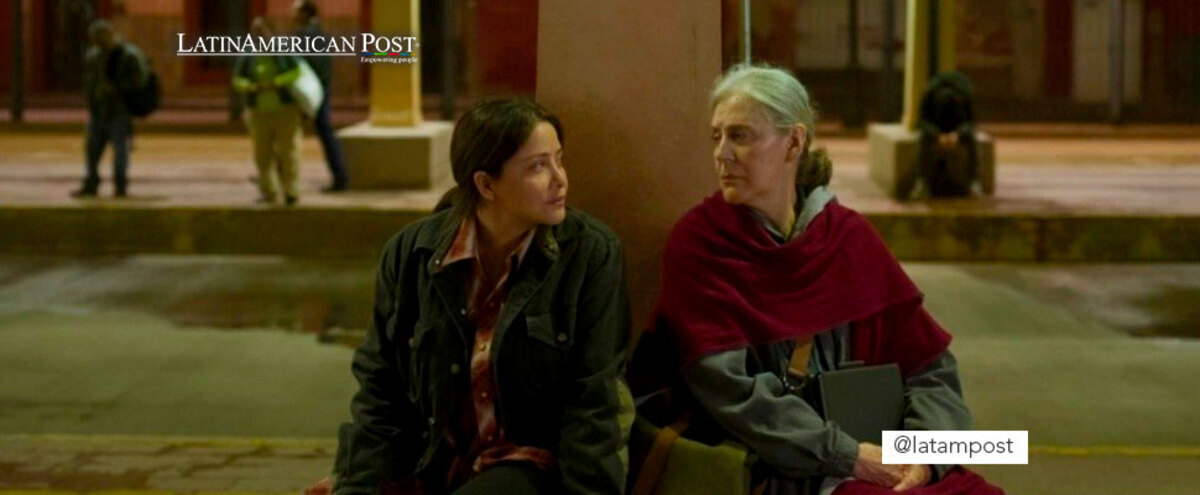Review of “Noise”: how to narrate the disappearance in today’s Mexico?
The new movie released on Netflix revolves around a very important theme, but it did not manage to land it in the best way. This is our "Noise" review.

Photo: Netflix
LatinAmerican Post | July Vanesa López Romero
Escucha este artículo
Leer en español: Reseña de “Ruido”: ¿cómo narrar la desaparición en el México actual?
Forced disappearance is perhaps one of the most deeply rooted social problems in Latin American culture and history. An epidemic that began in the years of the dictatorships and that to this day remains alive throughout the region. The cinema is no stranger to this issue and many films and documentaries seek to portray and make visible this crime and its victims and denounce governments and states for the negligence they show in these cases.
That is precisely what "Noise" is looking for, a film released at the beginning of this year on the Netflix platform. The film directed by Natalia Beristáin tells the story of Julia, a woman whose daughter, Ger, disappeared 9 months ago. Who, tired of not receiving help or answers from the prosecution, decides to embark on a trip in the company of a journalist to Find your daughter, dead or alive? On her journey, Julia meets people who want to help her and those who want to stop her and now threaten her so that she does not continue her search.
Although "Noise" manages to portray forced disappearance in some ways and what the victims experience to find their disappeared, it also has several errors at the time of execution, which is why the film finds it difficult to stand on its own. But let's start by reviewing what those hits were in our "Noise" review.
Also, read Goodbye 2022!: These are the 10 Latin American films of the year
The hits
It is necessary to mention in the first place, and I would say that the most important since this is what manages to keep the film standing, is the performance of Julieta Egurrola, who plays Julia. Egurrola is a well-known Mexican actress whose career of more than 45 years has been formed in film, television, and theater. She is also the mother of Natalia Beristáin, the director of “Ruido”. Even Arturo Beristáin, who plays Arturo, Ger's father and Julia's ex-husband, is the director's father in real life. Thus, in the film, we can find an intimacy that surely comes from this family work and that is notable in the performance of both actors, especially Egurrola.
On the other hand, the story is based on real events and collects the testimonies of people who have been victims of this crime in real life. One of the groups that Julia meets in the film is the Voz y Dignidad collective, which is made up of women who search for bodies in the open field and who are relatives of the disappeared. This allows the film to be clear and direct when it comes to showing the pain and fear marked in the collective history of Mexico and also the failures and negligence of the authorities.
The mistakes
But even though these two factors are important, there are more failures than successes. The film's script is not strong enough, the conversations are stuffy, and they give the data and fall short when it comes to generating other feelings in the viewer. Beyond Egurrola's performance and Beristáin's short screen time, no other character manages to convey much and I dare say that this is not a fault of the actors, but of that same script that falls short, that fails time to give life to these characters and that it is not clear what is focused on.
And it is that "Noise" has several narrative threads, but it seems that none is concluded. We could overinterpret this characteristic and say that the film seeks to demonstrate that the justice system in Mexico has unfinished processes, but even if that had been the intention, the execution takes away a lot of force from the idea.
In terms of style, the film seeks to explore through different uses of the camera more creative ways to show the affections of the protagonist, but sometimes it turns towards the documentary. This, again, does not seem to be on purpose, but rather careless, as if it wants to cover everything but does not cover anything in particular. The documentary genre manages to convey strong emotions without leaving its clarity and characteristic of reality, a clear example of this, which touches the same subject, is "The Three Deaths of Marisela Escobedo" which is also available on Netflix.
Finally, the film is slow, it lasts 1 hour and 45 minutes, but there are moments in which there are no dialogues or much happens on the screen, but they are not moments that allow introspection, rather they seem put on for no reason. Although the idea of "Noise" is interesting, it is not new or well executed, because it is not very entertaining to watch either.
A lot of hype has been made about it, perhaps because that's how Netflix marketing works, but unfortunately this is not a film that does justice to the need to tell these collective pains and rages through art.





